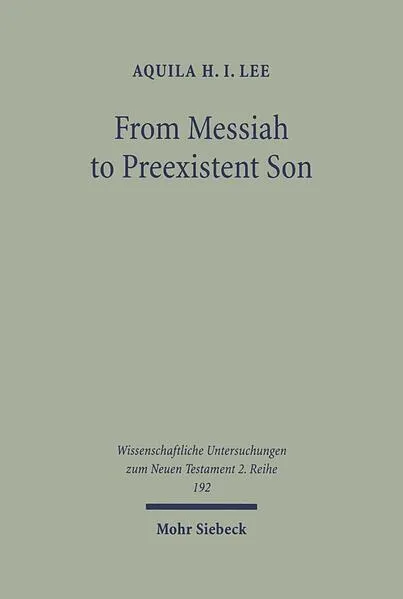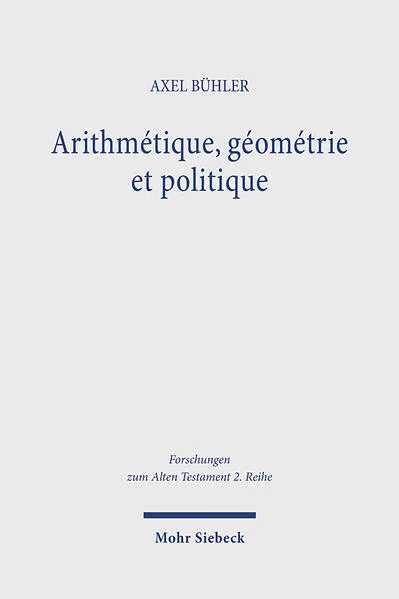
Aquila H.I. Lee
From Messiah to Preexistent Son
- Jesus' Self-Consciousness and Early Christian Exegesis of Messianic Psalms
ISBN: 978-3-161-57057-5
0 Seiten | € 94.00
E-Book [Kindle]
Dieses Buch gehört zur Reihe Wissenschaftliche Untersuchungen zum Neuen Testament 2. Reihe und enthält ca. 6 Folgen.
Erscheinungsdatum:
00.12.2019
Sonstiges
Aquila H.I. Lee
From Messiah to Preexistent Son
Jesus' Self-Consciousness and Early Christian Exegesis of Messianic Psalms
Aquila H.I. Lee explores the development of early Christian understanding of Jesus as the preexistent Son of God. He first reviews recent attempts to explain the development as a result of the influence of Jewish angelology and similar speculations. In the second part he argues that neither the personification of various attributes of God, including wisdom, nor speculations about principal angels and a preexistent messiah in Second Temple Judaism ever provided a ready-made category for viewing Jesus as a divine and preexistent being alongside God.
An examination of the Synoptic evidence for Jesus' self-consciousness of divine sonship and divine mission in the whole context of his life and teaching shows that his self-understanding was open to interpretation in terms of pre-existence. The author also examines the early Christian use of Pss 110:1 and 2:7 against this background. He proposes that the root of preexistent Son Christology is to be found in early Christian exegesis of these two messianic psalms (the catalyst) in the light of Jesus' self-consciousness of divine sonship and divine mission (the foundation). The tremendous impact left by the resurrection event and the resulting conception of Jesus "literally" enthroned to God's right hand led them to see Jesus as the preexistent Lord and Son of God.
In the final part of this book Aquila Lee argues that the pre-Pauline 'sending' formula "God sent his Son" (Gal 4:4-5; Rom 8:3-4; Jn 3:16-17; and 1 Jn 4:9) derives from this understanding of Jesus as the preexistent Son of God rather than from divine wisdom christology.
An examination of the Synoptic evidence for Jesus' self-consciousness of divine sonship and divine mission in the whole context of his life and teaching shows that his self-understanding was open to interpretation in terms of pre-existence. The author also examines the early Christian use of Pss 110:1 and 2:7 against this background. He proposes that the root of preexistent Son Christology is to be found in early Christian exegesis of these two messianic psalms (the catalyst) in the light of Jesus' self-consciousness of divine sonship and divine mission (the foundation). The tremendous impact left by the resurrection event and the resulting conception of Jesus "literally" enthroned to God's right hand led them to see Jesus as the preexistent Lord and Son of God.
In the final part of this book Aquila Lee argues that the pre-Pauline 'sending' formula "God sent his Son" (Gal 4:4-5; Rom 8:3-4; Jn 3:16-17; and 1 Jn 4:9) derives from this understanding of Jesus as the preexistent Son of God rather than from divine wisdom christology.
Unterstütze den lokalen Buchhandel
Nutze die PLZ-Suche um einen Buchhändler in Deiner Nähe zu finden.
Bestelle dieses Buch im Internet
| Veröffentlichung: | 00.12.2019 |
| Art des Mediums | E-Book [Kindle] |
| Preis DE | EUR 94.00 |
| Preis AT | EUR 96.70 |
| Auflage | 1. Auflage |
| Reihe | Wissenschaftliche Untersuchungen zum Neuen Testament 2. Reihe |
| ISBN-13 | 978-3-161-57057-5 |
| ISBN-10 | 316157057X |
Über den Autor
Born 1963; BA at National University of Buenos Aires; M.Div. at Biblical Graduate School of Theology (Singapore); 2003 Ph.D. at University of Aberdeen; Lecturer of New Testament and Greek at Biblical Graduate School of Theology (Singapore).Diesen Artikel teilen
0 Kommentar zu diesem Buch
.... weitere Publikationen von Mohr Siebeck
Leserunde
Okkultes Historiendrama über den bedeutendsten Geheimkult der Antike - Spannung, Archäologie, Liebe und Mystery
Bewerbungsfrist bis zum: 17.03.2026

















